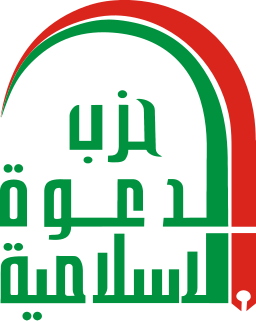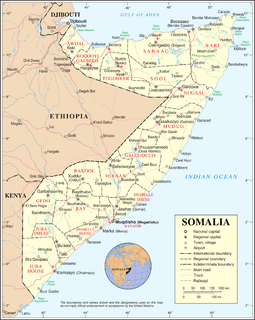Related Research Articles
Jemaah Islamiyah is a Southeast Asian militant extremist Islamist terrorist group based in Indonesia, which is dedicated to the establishment of an Islamic state in Southeast Asia. On 25 October 2002, immediately following the JI-perpetrated Bali bombing, JI was added to the UN Security Council Resolution 1267 as a terrorist group linked to Al-Qaeda or the Taliban.

The Islamic Dawa Party, also known as the Islamic Call Party, is an Islamist political party in Iraq. Dawa and the Supreme Islamic Iraqi Council are two of the main parties in the religious-Shiite United Iraqi Alliance, which won a plurality of seats in both the provisional January 2005 Iraqi election and the longer-term December 2005 election. The party is led by Haider al-Abadi, who was the Prime Minister of Iraq from 8 September 2014 to 25 October 2018. The party backed the Iranian Revolution and also Ayatollah Ruhollah Khomeini during the Iran–Iraq War and the group still receives financial support from Tehran despite ideological differences with the Islamic Republic. The Party was known for its terrorist activities, which included one of the first suicide bombings, and may have included the 1983 Beirut barracks bombings.

On or near January 1, 2000, a series of Islamist terrorist attacks linked to al-Qaeda were planned to occur in the context of millennium celebrations, including bombing plots against four tourist sites in Jordan, the Los Angeles International Airport (LAX) and USS The Sullivans and the hijacking of Indian Airlines Flight 814.

The Peace Companies are an Iraqi armed group linked to Iraq's Shia community. They are a 2014 revival of the Mahdi Army that was created by the Iraqi Shia cleric Muqtada al-Sadr in June 2003 and disbanded in 2008.

Bernardo Provenzano was an Italian mobster and chief of the Sicilian Mafia clan known as the Corleonesi, a Mafia faction that originated in the town of Corleone, and de facto il capo dei capi. His nickname was Binnu u tratturi because, in the words of one informant, "he mows people down." Another nickname was il ragioniere due to his apparently subtle and low-key approach to running his crime empire, at least in contrast to some of his more violent predecessors.
Terrorism in Saudi Arabia has mainly been attributed to Islamic extremists. Their targets included foreign civilians—Westerners affiliated with its oil-based economy—as well as Saudi Arabian civilians and security forces. Anti-Western attacks have occurred in Saudi Arabia dating back to 1995. Saudi Arabia itself has been accused of funding terrorism in other countries, including Syria.

The Iraqi invasion of Kuwait was an operation conducted by Iraq on 2 August 1990, whereby it invaded the neighboring State of Kuwait, consequently resulting in a seven-month-long Iraqi military occupation of the country. The invasion and Iraq's subsequent refusal to withdraw from Kuwait by a deadline mandated by the United Nations led to a direct military intervention by a United Nations-authorized coalition of forces led by the United States. These events came to be known as the first Gulf War, eventually resulting in the forced expulsion of Iraqi troops from Kuwait and the Iraqis setting 600 Kuwaiti oil wells on fire during their retreat.
The Wood Green ricin plot was an alleged bioterrorism plot to attack the London Underground with ricin poison. The Metropolitan Police Service arrested six suspects on 5 January 2003, with one more arrested two days later.
Terrorism in Tajikistan stems largely from the forces of the political opposition who opposed the comprehensive peace agreement that ended the civil war in 1997. President Emomali Rahmonov and UTO leader Said Abdullah Nuri signed the agreement on 27 June, believing it would bring an end to hostilities. However, dissident Islamist militants led by Tohir Yo‘ldosh and Juma Namangani formed the Islamic Movement of Uzbekistan in 1998, allying with Al-Qaeda and vowing to unite Central Asia as an Islamic state.
Terrorism in Egypt in the 20th and 21st centuries has targeted the Egyptian government officials, Egyptian police and Egyptian army members, tourists, Sufi Mosques and the Christian minority. Many attacks have been linked to Islamic extremism, and terrorism increased in the 1990s when the Islamist movement al-Gama'a al-Islamiyya targeted high-level political leaders and killed hundreds – including civilians – in its pursuit of implementing traditional Sharia law in Egypt.
The 1983 Kuwait bombings were attacks on six key foreign and Kuwaiti installations on 12 December 1983, two months after the 1983 Beirut barracks bombing. The 90-minute coordinated attack on two embassies, the country's main airport, and petro-chemical plant was more notable for the damage it was intended to cause than what was actually destroyed. What might have been "the worst terrorist episode of the twentieth century in the Middle East" killed only six people because of the bombs' faulty rigging.
Sheikh Yasser al-Habib is a Kuwaiti Twelver Shia Ulama or rafidi speaker, and the head of the London-based Khoddam Al-Mahdi Organization, as well as Al-Muhassin mosque in Fulmer, Buckinghamshire, and the writer of The Lady of Heaven. Al-Habib attempts to express his religious views and his investigations and conclusions in the Islamic history, based upon Shia and Sunni sources.

Ali Hassan Abdullah Abdulemam, widely known as Ali Abdulemam is a Bahraini liberal blogger and contributor to Global Voices. He is the founder of Bahrain Online, a popular online forum and pro-democracy news website, and a member of the research and advocacy group Bahrain Watch. Although he went into hiding in March 2011 to escape the Bahraini Government's crackdown on protesters, he was convicted in absentia for plotting to overthrow the Government, and sentenced to 15 years in prison. Global human rights organizations are unconvinced of Abdulemam's guilt and have voiced opposition to the persistent censorship and obstruction of journalists in the region. In 2013, Abdulemam escaped to the UK where he was swiftly granted political asylum.
The Kuwaiti protests refers to the series of 2011–2012 demonstrations for government reforms in the state of Kuwait. In November 2011, the government of Kuwait resigned in response to the protests, making Kuwait one of several countries affected by the Arab Spring to experience major governmental changes due to unrest. The protests began with stateless people (Bedoon).

Abdulwahab Hussain Ali Ahmed Esmael is a Bahraini political activist, writer, religious figure and philosopher. He was one of the most prominent opposition leaders in the 1990s uprising when he was arrested twice for a total length of five years in which he was allegedly subjected to solitary confinement and torture. After his release in 2001, he supported government reform plans.

The Sinai insurgency is an ongoing insurgency in the Sinai Peninsula, Egypt, that was commenced by Islamist militants against Egyptian security forces, which have also included attacks on civilians. The insurgency began during the Egyptian Crisis, during which the longtime Egyptian president Hosni Mubarak was overthrown in the Egyptian revolution of 2011.
The Ansarullah Bangla Team (ABT), also called Ansar Bangla is an Islamic Jihadi organization in Bangladesh, implicated in crimes including some brutal attacks and murders of atheist bloggers from 2013 to 2015 and a bank heist in April 2015. The gang was outlawed days after the bank robbery by the Ministry of Home Affairs on 25 May 2015. The group has been claimed by police to be linked to Islami Chhatra Shibir, the student wing of Jamaat-e-Islami party in Bangladesh.

This is a 2015 timeline of events in the Somali Civil War (2009–present).
Fahad Maziad Al Rajaan was born on 23 December 1948 in Kuwait. From 1992 to 2015, Fahad Al Rajaan served as Company Director of Ahli United Bank (UK) Plc. Al Rajaan was sentenced in absentia in a Kuwait court for life for embezzling public funds and hiding them in accounts abroad.
References
- ↑ "Jihadi terrorism, from Iraq to Kuwait". Asia Times Online. 24 February 2005. Archived from the original on 24 February 2005. Retrieved 18 September 2014.CS1 maint: unfit URL (link)
- ↑ Forbes Article